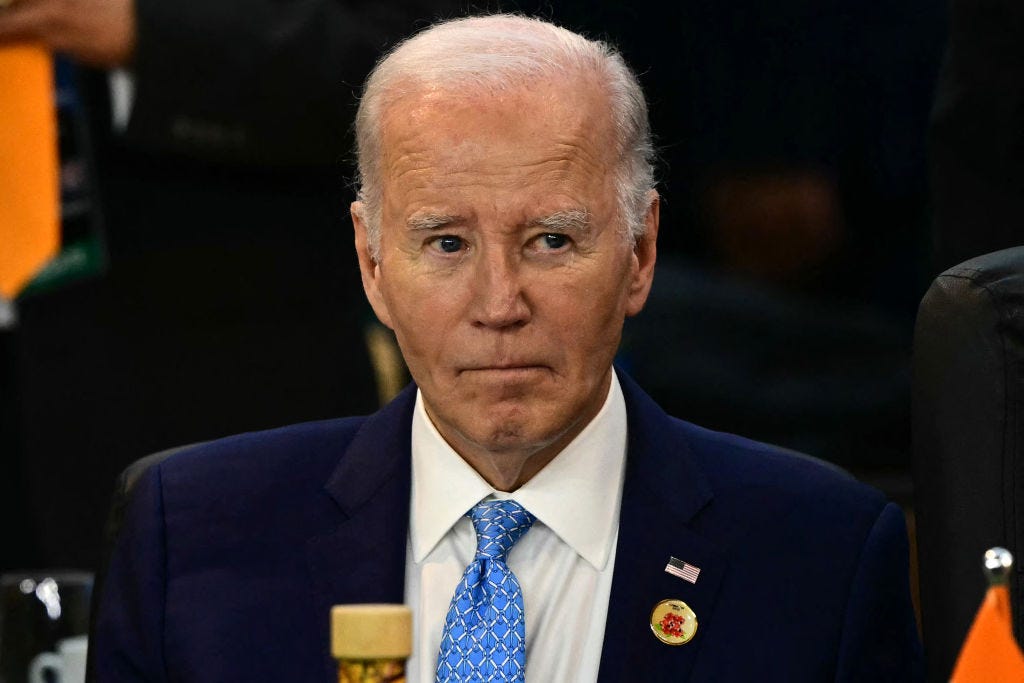The Chaos President
What is Joe Biden thinking?
A scenario: one presidential candidate, a bitter rival of the incumbent, has just won an election. He is about two months away from entering the Oval Office. The current president is backing a war overseas that has lasted nearly three years and cost American taxpayers many billions of dollars. The war, between two nations—one, the invader, and the other, the invaded—has killed or wounded as many as one million people. The invader holds the largest nuclear arsenal on Earth. For much of the war, the president has aggressively boosted the military capabilities of the invaded country. One red line was always straightforward: not offering weaponry that would strike directly at the invader and precipitate, potentially, a direct clash between the United States and the world’s other great nuclear superpower. Most of the military elite of the last century agreed this would be disastrous. The incoming president has talked vaguely of a negotiated settlement to end the war—not at all on the invaded nation’s terms—and his vice president has been especially outspoken about the need to end all hostilities. But the outgoing president had one last gift to grant the invaded country: long-range missiles to strike directly at the heart of the invader, the sort that could easily bring the two great nuclear superpowers into direct conflict. The missiles, on their own, could not deliver victory for the invaded country, but they could readily increase the possibility of nuclear war.
The above, obviously, describes Russia’s invasion of Ukraine, and allows for a bit of clarity by momentarily striking the names of Joe Biden and Donald Trump from the record. The war, in February, will have lasted three years, and few Western elites seem to care about finding a path to ending the carnage. They are especially—and frighteningly—unbothered by the possibility of direct war between Russia and the United States, and the remote chance civilization-ending nuclear missiles are deployed. In America, Democrats and traditional GOP hawks have been united around two irreconcilable arguments: Vladimir Putin is an absolute madman bent on conquering all of Europe and he is also someone who would never launch a nuclear strike, and such threats cannot be taken seriously. If Putin is the unhinged autocrat Western elites believe he is, shouldn’t the nuclear threat be avoided at all costs? Wouldn’t a dictator who wants to subdue the West launch such a missile if he got desperate enough?
I, like you, have no real concept of what Putin is thinking. I can only elucidate the grim reality before us. What’s been apparent since 2022—and what crackpot realists cannot admit—is that this conflict does not resemble World War II, like so many pundits have declared. It is much more akin to the first World War, with battle lines that hardly move and new technologies, like drones, that fortify defenses at the expense of the military trying to push forward. Russia cannot conquer Europe because it can’t even take Kyiv. There is no such thing as a blitzkrieg in 2020s warfare. It’s not even clear, as much as the West insists otherwise, that Russia wants any more than fresh chunks of a former Soviet republic. They will have to settle for Crimea, which they seized a decade ago, and perhaps some of the territory they conquered in the current war. Ukraine and the West, meanwhile, cannot live their dream of crushing Russia and winning back every piece of land Putin has seized since the 2010s. Russia will not lose a land war, just as they won’t be able to move troop columns into Poland. Putin and Zelenskyy are maximalists in their own way, and they both, at some point in the near future, will have to be forced to a negotiating table.
Otherwise, the doomsday clock ticks closer to midnight. Biden, eighty-two and about to retire, does not seem to care. Why else authorize the long-range ATACMS to strike Russia? Why else permit what even the rapacious Cold Warriors sought to avoid? What will actually be accomplished? The Biden administration is cavalier about all of it, and won’t entertain the notion of any kind of settlement to end the war. These agreements, naturally, are fraught, because a truth will have to be confronted that the most zealous American liberals and neoconservatives still cannot bring themselves to speak aloud: Russia is not vanishing off the face of the Earth. Regime change is not imminent. If Putin dies, this does not mean there will be democracy in Russia, or any repeat of the 1990s, when the United States could dictate policy there. Ukraine will not join NATO. Not negotiating an end to the war will mean more suffering for Ukraine and Russia alike, and a war of attrition that Russia, with its larger population and fresh infusion of North Korean troops, is better positioned to win. America must play a direct role in the war’s end because America is funding this war.
In the meantime, it will be up to the mercurial Trump to strike a peace deal. Given the general incoherence of his incoming administration—and his insectoid attention span—there are plenty of reasons to be pessimistic. What is clear, though, is that if the roles were reversed and it were a departing Trump greenlighting ATACMS while Biden was potentially waiting to negotiate some kind of settlement, the left would call Trump a madman.



